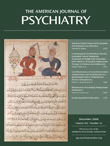Dr. Wagner and Colleagues Reply
To the Editor: We appreciate the comments of Dr. Waslick on our study. First, with regard to study subjects, DSM-IV criteria for bipolar I disorder, manic or mixed were required for both our study and the study conducted by Geller et al. However, Geller et al. also required subjects to have at least one cardinal symptom of elation and/or grandiosity. Also, Geller et al. redefined manic/hypomanic episodes in their study as the entire length of illness, whereas we used DSM-IV definitions for manic episodes. This may account for some differences between the two study groups. Second, in response to Dr. Waslick and Dr. Lysne et al., the investigators in the study had the option of discontinuing stimulants prior to randomization in this study if they thought that stimulants were exacerbating the subject’s mania. The presence of concurrent ADHD and stimulant treatment did not affect baseline ratings of psychopathology or treatment response.



